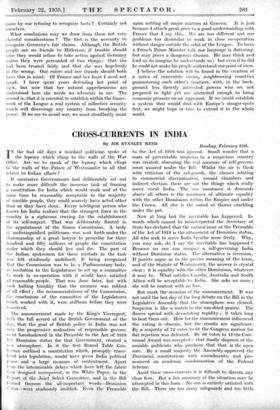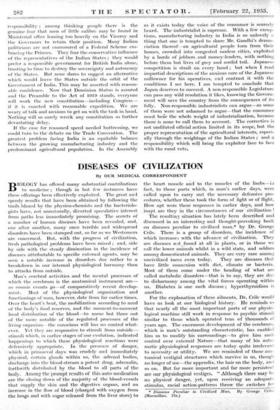CROSS-CURRENTS IN INDIA
IN the bad old days a mordant politician spoke of the leprosy which -clung to the walls of the War Office. Are we to speak of the leprosy -which clings to the walls of the Palace of Westminster in all that relates to Indian affairs ?
If successive Governments had deliberately set out to make more difficult the immense task of framing a constitution for India which would work and at the same time be reasonably acceptable to the majority of sensible people, they could scarcely have acted other than as they have done. Every intelligent person who knows his India realizes that the strongest force in the country is a righteous craving for the establishment of its self-respect. That was deliberately flouted in the appointment of the Simon Commission. A body of undistinguished politicians was sent forth under the chairmanship of a great lawyer to prescribe for three hundred and fifty millions of people the constitution under which they should live and die. The part of the Indian spokesmen for these myriads in the task was left studiously undefined. It being recognized that the Commission was to be a Parliamentary body, an invitation to the Legislatures to set up a committee to work in co-operation with it would have satisfied all reasonable people. That was done later, but with such halting timidity that the measure was Jobbed of all effect ; the recommendations of the Commission, the conclusions of the committee of the Legislatures which worked with it, were stillborn before they were conceived.
The announcement made by the King's Viceregent, with the full accord of the British Government of the (lay, that the goal of British policy in India was not only the progressive realization of responsible govern- ment foreshadowed in the Preamble to the Act of 1919 but Dominion status for that Government, created a new atmosphere. In it the first Round Table Con- ferenee outlined a constitution which, promptly trans- lated into legislation, would have given India political peace and a large measure of contentment. Apart from the interminable delays which have left the fabric then designed unimpaired, in the White Paper, in the lteport of the Joint Select Committee, and in the Bill framed thereon the all-important words—Dominion status-1--were studiously omitted. Even the Preamble to the Act of 1919 was ignored. Small wonder that a mass of preventable suspicion in a suspicious country was, created, obscuring the real measure of self-govern- ment assured under the Bill. Whilst the air is thick with criticism of the safeguards, the clauses relating to commercial discrimination, second- chambers and indirect election, these are not the things which really move vocal India. The one assurance it demands above all others is the assurance of ultimate equality with the other Dominions within the Empire and under the Crown. All else is the sound of thorns crackling under the pot.
Now at long last the inevitable has happened. In words which cannot be misinterpreted the Secretary of State has .declared that the natural issue of the Preamble of the Act of 1919 is the attainment of Dominion status. All who seek to serve India breathe more freely. Why, you may ask, do I say the inevitable has happened ? Because no one can imagine a self-governing India without Dominion status. The alternative is secession. If purists argue as to the precise meaning of the term, and of the Statute of Westminster, the answer is crystal clear ; it is equality with the other Dominions, whatever it may be. What satisfies Canada, Australia and South Africa will be acceptable to India. She asks no more ; she will be content with no less.
But mark the occasion of the announcement. It was not until the last day of the long debate on the Bill in the Legislative Assembly that the atmosphere was cleared. Suspicion is like a match to the sun-dried prairie. The flames spread with devastating rapidity ; it takes long to beat them out. How far the announcement influenced the voting is obscure, but the results are significant. By a majority of 72 votes to 61 the Congress motion for flat rejection was defeated. By 68, votes to 15 the Com- munal Award was accepted ; that finally disposes of the amiable publicists who proclaim that that is the open sore. By a small majority the Assembly approved the Provincial .constitutions with amendments, and pro- nounced an academic condemnation of the Federal Scheme.
Amid these cross-currents it is difficult to discern any dear flow. But a fair summary of the situation may be attempted in this form : No one is entirely satisfied with the Bill. There are too many safeguards and too little responsibility ; among thhiking people there is the genuine fear that men of little calibre may be found in • Ministerial office leaning too.heavily on the Viceroy and the Governors to retain their position. Many Indian politicians are not enamoured of a Federal Scheme em- bracing the Princes. They fear the conservative influence of the representatives of the Indian States ; they would prefer a responsible government for British India alone, trusting to time to destroy the sovereignty and autonomy of the States. But none dares to suggest an alternative which would leave the States outside the orbit of the Government of India. This may be asserted with reason- able confidence. Now that Dominion Status is assured and the Preamble to the Act of 1919 stands, everyone will work the new constitution—including Congress— if it is enacted with reasonable . expedition. We are weary of talk and anxious to get on with the task in hand. Nothing will so surely wreck any constitution as further devastating delay.
If the ease for reasoned speed needed buttressing, we could turn to the debate on the Trade Convention. . The greatest problem facing India , is an . equitable balance between the growing manufacturing industry and the predominant agricultural population. In the Assembly as it exists today the voice of the consumer is scarcely heard. The industrialist is supreme. With a few excep- tions, manufacturing industry in India is so unlovely a thing that one is tempted to share Mr. Gandhi's denun- ciation thereof—an agricultural people torn from their homes, crowded into congested sunless cities, exploited by a horde of jobbers and money-lenders, with nothing before them but lives of grey and sordid toil. Japanese competition is strait on every hand ; but when I read impartial descriptions of the anxious care of the Japanese rnillowner for his operatives, and contrast it with the conditions I see here, I am tempted to conclude that Japan deserves to succeed. A non-responsible Legislature can pass any wild resolution it likes, knowing the Govern- ment will save the country from the consequences of its folly. Non-responsible industrialists can argue—as some of them were not ashamed to argue—that the consumer must bar the whole _weight of industrialization, because there is none to call them to account. The corrective is not undiluted official action limited in its scope, but the proper representation of the agricultural interests, especi- ally through the weightage of the Indian States ; and a responsibility which will bring the exploiter face to face with the rural vote,



















































 Previous page
Previous page